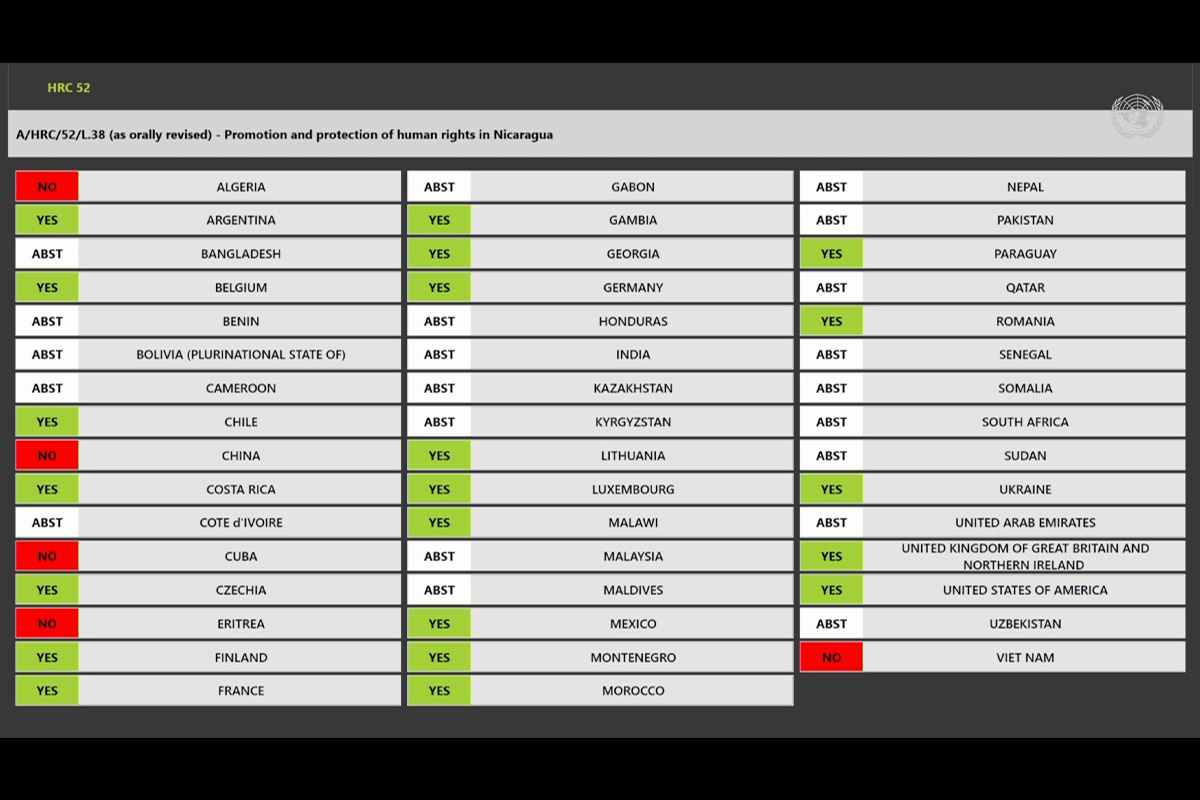The Colectivo 46/2 coalition has campaigned for the two-year renewal and thematic strengthening of the Council’s resolution on Nicaragua since its global call to the Council in December 2022.
The resolution was adopted with 21 votes in favour, 5 against and 21 abstentions. During the Council’s debate ahead of the vote, an overwhelming majority of countries expressed strong support to the resolution and concern over Nicaragua’s crisis, including key Latin American States Argentina and Mexico. Even governments closer to Nicaragua – Bolivia and Honduras – have refused to oppose the resolution. The increased support to the resolution in comparison with 2022 reflects the acute concerns of the international community.
The vote renewed Council resolution 49/3, passed in March 2022, upholding the mandates of the Group of Human Rights Experts on Nicaragua (GHREN) and of the Office of the High Commissioner for Human Rights, tasked with documenting grave abuses by authorities at all levels in the Central American country. The GHREN is further mandated to identify root causes of violations and their perpetrators, and to preserve evidence to support future justice processes.
This new resolution also widens the scope of the GHREN’s work to include a stronger focus on violence and abuses against Nicaragua’s Indigenous, rural and Afro-descendant communities, individuals stripped of their nationality, and on acts of sexual and gender-based violence.
‘The exceptional two-year renewal of the Human Rights Council’s resolution on Nicaragua is nothing but the sole reflection of the gravity and steady worsening of Nicaragua’s human rights crisis, and the clear lack of its government to work with the UN to address it,’ said Claudia Paz y Paz from CEJIL, as part of the Colectivo 46/2, a coalition of Nicaraguan and international civil society organisations
‘We welcome this decision and thank all States who supported this crucial accountability mechanism, which will ensure that the extensive catalogue of abuses taking place in Nicaragua does not fall under the international radar’, said Alexandra Salazar from Unidad de Defensa Jurídica (UDJ) of the Colectivo 46/2.
‘Nicaraguan authorities under instructions of President Ortega and Vice-President Murillo have reached new extremes in their efforts to suppress all dissent, but today, the international community sent a clear message: perpetrators at all levels will eventually be held accountable,’ added Olga Valle from Urnas Abiertas of the Colectivo 46/2.
The text of the new resolution was drafted by eight nations from across the Americas: Costa Rica, Canada, Chile, Colombia, Peru, Paraguay, Ecuador and Brazil.
The vote comes only weeks after the GHREN issued its first report on human rights violations in Nicaragua and in which experts found extensive evidence of the crimes against humanity, murder, imprisonment, torture including sexual violence, forced deportation, as well as politically motivated persecution against dissidents and those perceived to be so. The experts determined these grave abuses are carried out by ‘authorities of all branches of the government and at all levels’, including President Daniel Ortega and Vice-President Rosario Murillo.
‘The renewal of this resolution means that, despite government efforts to close what remains of the country’s civic space, activists and civil society in Nicaragua will still have a safe global stage to expose the worst abuses of the regime that remain unpunished,’ said Carlos Quesada from the International Institute on Race, Equality and Human Rights (Race and Equality) of the Colectivo 46/2.
Before the vote, members of Colectivo 46/2, had called for the GHREN to more actively tackle concerns over abuses committed against Indigenous, rural and Afro-descendant groups in Nicaragua. This followed widespread reports of invasions and violence by armed settlers on protected lands that traditionally belong to these groups, with the reported acquiescence of the authorities.
‘By extending and reinforcing the mandate of its investigative body on Nicaragua to document abuses against Indigenous and Afro-descendant Peoples, the Human Rights Council is providing critical support for the rights of historically marginalised communities in Nicaragua,’ said Amaru Ruiz from Fundación del Río.
For five years now, since mass protests were met with a brutal response in April 2018, Nicaragua has been plunged into a deepening political and social crisis under an increasingly authoritarian government led by Daniel Ortega. During this period, it is estimated that over 600,000 Nicaraguans have had to flee the country, an unprecedented exodus in the country’s history.
Download as PDF




